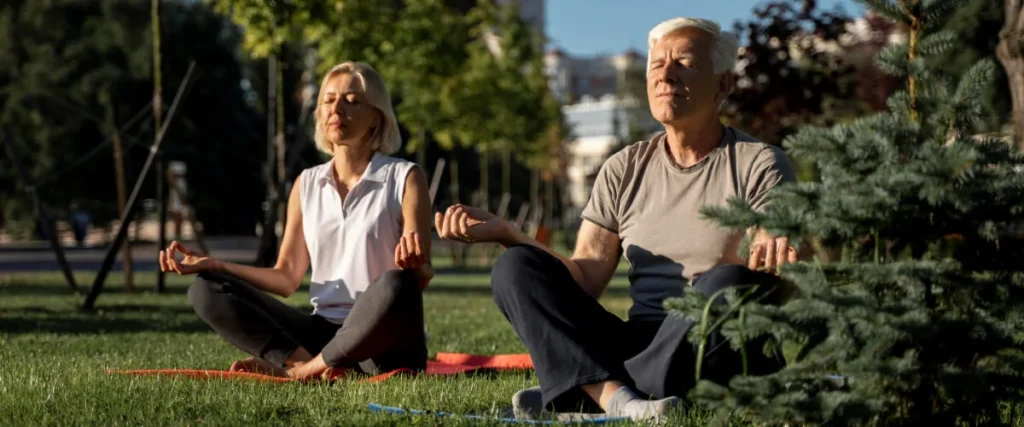Understanding the Importance of Senior Mental Health:
Senior mental health is crucial for several reasons. It directly impacts an individual’s quality of life, enabling them to lead fulfilling and independent lives during their golden years. Furthermore, maintaining good mental health can help prevent or alleviate the symptoms of mental health disorders, such as depression, anxiety, and Alzheimers, which are prevalent among seniors.
12 Ways to Improve Senior Mental Health
Prioritizing senior mental health is essential as it directly impacts their emotional well-being and cognitive abilities. Below are 12 practical ways to improve senior mental health:
1. Maintaining Social Connections:
Social connections play a pivotal role in senior mental health. Engaging in regular social interactions helps combat feelings of loneliness and isolation, which can contribute to poor mental health. Seniors should prioritize building and maintaining relationships with family members, friends, and their communities. Joining social groups, participating in community events, or volunteering can provide opportunities for social engagement.
2. Engaging in Physical Activities:
Regular physical activity is not only beneficial for physical well-being but also has a positive impact on mental health. Exercise releases endorphins, the “feel-good” hormones, which can reduce stress, boost mood, and improve cognitive function. Seniors should incorporate activities such as walking, swimming, or yoga into their daily routine to reap these mental health benefits.
3. Promoting Cognitive Stimulation:
Cognitive stimulation is essential for maintaining mental acuity and preventing cognitive decline. Seniors can engage in activities that challenge their brains, such as puzzles, crosswords, reading, or learning new skills. Additionally, attending educational classes or participating in brain-training exercises can help keep their minds sharp and enhance their overall mental well-being.
Read More: 8 Free Online Games for Seniors
4. Encouraging Healthy Eating Habits:
Proper nutrition plays a significant role in senior mental health. A well-balanced diet rich in fruits, vegetables, whole grains, lean proteins, and omega-3 fatty acids provides essential nutrients that support brain health. Seniors should aim to minimize processed foods, sugary snacks, and excessive caffeine, as these can negatively affect mood and cognitive function.

5. Practicing Stress Management Techniques:
Stress can have a detrimental impact on mental health, especially for seniors. Encouraging the use of stress management techniques can help seniors cope effectively with stressors. Deep breathing exercises, meditation, mindfulness, and engaging in relaxing activities like gardening or listening to music can alleviate stress and promote emotional well-being.
6. Seeking Professional Support:
Seniors should not hesitate to seek professional support when needed. Mental health professionals, such as therapists, counselors, or live-in caregivers, can provide guidance, counseling, and therapy tailored to the specific needs of older adults. Caregivers at ConsidraCare can assist seniors in managing emotional challenges, addressing underlying issues, and improving their overall mental well-being.
7. Enhancing Sleep Quality:
Quality sleep is essential for optimal mental health. Seniors should establish a consistent sleep routine, create a comfortable sleep environment, and practice good sleep hygiene. Avoiding caffeine and electronic devices before bedtime, ensuring a quiet and dark room, and engaging in relaxation techniques can promote restful sleep and improve overall mental well-being.
Read More: 10 Natural Sleep Remedies for the Elderly
8. Creating a Safe and Supportive Environment:
A safe and supportive environment is crucial for senior mental health. It involves creating a physical space that promotes comfort, security, and independence. Seniors should have access to necessary resources, adaptive equipment, and a supportive network of live-in caregivers. This environment should foster dignity, respect, and empowerment, allowing seniors to thrive both mentally and emotionally.
9. Fostering Meaningful Hobbies and Interests:
Engaging in meaningful hobbies and interests is an excellent way to enhance senior mental health. Pursuing activities that bring joy, fulfillment, and a sense of purpose can combat boredom, boost self-esteem, and promote a positive outlook on life. Seniors should explore various hobbies, such as painting, gardening, playing an instrument, or volunteering, to find what resonates with them.

10. Embracing Technology for Mental Well-being:
Technology can be a valuable tool for improving senior mental health. Seniors can use digital platforms to stay connected with loved ones, join online communities, access educational resources, engage in brain-training apps, or participate in virtual mental health support groups. Embracing technology opens up new possibilities for socialization, learning, and mental stimulation.
11. Maintaining a Positive Outlook:
Maintaining a positive outlook is vital for senior mental health. Seniors should focus on gratitude, self-compassion, and reframing negative thoughts. Engaging in activities like journaling, practicing affirmations, or participating in mindfulness exercises can help cultivate a positive mindset, reduce stress, and enhance overall mental well-being.
12. Emphasizing the Role of Family and Community:
The support of family and community is invaluable for senior mental health. Regular interactions with loved ones, involvement in social activities, and participation in community events can provide a sense of belonging, purpose, and emotional support. Families and communities should foster inclusive environments that value and prioritize the mental well-being of seniors.
Conclusion:
In conclusion, improving senior mental health is crucial for promoting overall well-being and quality of life. By utilizing the above 12 practical tips, seniors can enhance their mental well-being and enjoy their golden years to the fullest.
Want to Learn More?
ConsidraCare’s caregivers for seniors are trained to offer professional support and companionship to seniors. Please reach out to us at wecare@considracare.com or call us at 1-855-410-7971.
FAQ’s
1. How can the elderly improve their mood?
The elderly can improve their mood in several ways:
- Engaging in regular physical exercise or activities
- Maintaining a social support system
- Practicing relaxation techniques
- Seeking professional help if needed
2. How do you treat mental illness in the elderly?
Treating mental illness in the elderly typically involves a combination of approaches:
- Medication: Psychiatric medications prescribed by a healthcare professional can help manage symptoms of mental illnesses such as depression, anxiety, or bipolar disorder.
- Psychotherapy: Talk therapy or counseling sessions can be beneficial in addressing emotional and psychological issues. Cognitive-behavioral therapy (CBT) is commonly used.
- Supportive services: Assisting the elderly in accessing community resources, support groups, or case management services can provide them with additional help and support.
- Lifestyle changes: Encouraging a healthy lifestyle, including regular exercise, a balanced diet, and sufficient sleep, can contribute to overall mental well-being.
3. What activities are good for depressed seniors?
Engaging in meaningful and enjoyable activities can be helpful for depressed seniors. Here are some examples:
- Physical exercise: Regular exercise, even light activities like walking or gardening, can increase endorphin levels and improve mood.
- Socializing: Encouraging seniors to spend time with family, and friends, or participating in group activities can reduce feelings of isolation and loneliness.
- Creative outlets: Art therapy, music therapy, or engaging in hobbies like painting, playing an instrument, or crafting can provide a sense of purpose and fulfillment.
- Mindfulness and relaxation techniques: Encouraging seniors to practice mindfulness, deep breathing exercises, or engage in activities like yoga or tai chi can help reduce stress and promote relaxation.
- Pet therapy: Interacting with pets, such as having a dog or cat, or volunteering at an animal shelter, can provide companionship and emotional support.
4. How do seniors stay mentally active?
Seniors can stay mentally active through various activities that stimulate the mind:
- Reading books, newspapers, or magazines keeps the mind engaged and enhances cognitive abilities.
- Engaging in puzzles, crosswords, sudoku, or other brain games that challenge thinking and problem-solving skills.
- Learning new skills or hobbies, such as painting, playing an instrument, cooking, or learning a new language.
- Participating in social activities, such as joining clubs, attending community events, or volunteering, to keep the mind active and maintain social connections.
- Utilizing technology, such as using computers or tablets for online courses, brain-training apps, or staying connected with loved ones through video calls.
5. What are the 6 best brain foods?
While there isn’t a definitive list of the “best” brain foods, here are six examples of foods that are generally considered beneficial for brain health:
- Fatty fish: Rich in omega-3 fatty acids, fish like salmon, trout, and sardines can support brain function and reduce the risk of cognitive decline.
- Blueberries: Packed with antioxidants, blueberries have been linked to improved memory and cognitive function.
- Turmeric: The active compound in turmeric, called curcumin, has antioxidant and anti-inflammatory properties that may benefit brain health.
- Broccoli: High in antioxidants and other compounds, broccoli is known for its brain-boosting benefits and may help protect against cognitive decline.
- Pumpkin seeds: These seeds are a good source of antioxidants, magnesium, iron, zinc, and other nutrients that support brain health.
- Dark chocolate: Dark chocolate with high cocoa content contains flavonoids and antioxidants that may improve blood flow to the brain and enhance cognitive function.
Remember, maintaining a balanced diet that includes a variety of nutrient-rich foods is generally recommended for overall brain health.




